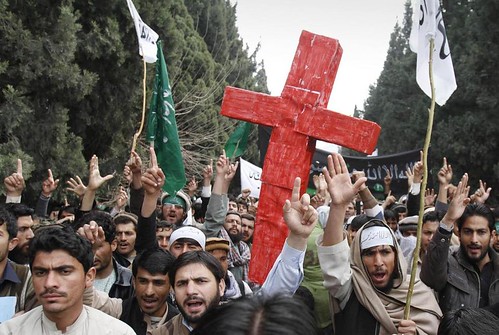
Afghanistan civilians demonstrate in Jalalabad in the aftermath of a massacre of at least 16 people when US troops left a base to commit mass murder., a photo by Pan-African News Wire File Photos on Flickr.
US and Afghanistan wrangle with deal to keep troops in place after 2014
White House plays down talk agreement has been reached, while Afghan officials say it must include US apology
Emma Graham-Harrison in Kabul and Dan Roberts in Washington
theguardian.com, Tuesday 19 November 2013 16.23 EST
The US and Afghanistan are close to reaching a draft security agreement that would allow American forces to stay in the country past 2014, Afghan officials have claimed. The deal is critical to Afghanistan's hopes of stability after western combat troops leave next year.
However any deal would need to include a public apology for past mistakes by American forces from the US government, the Afghan presidential spokesman Aimal Faizi said on Tuesday, prompting a flat denial from the Obama administration's top national security official that any such concession was on the table. An apology would almost certainly be politically controversial in Washington.
Faizi said an apology was part of the negotiations and “would acknowledge the suffering of the Afghan people, recognise mistakes in the 'war on terror' in Afghanistan, and guarantee that the mistakes of the past will not be repeated”.
But Susan Rice, Barack Obama's national security adviser, said: "No such letter has been drafted or delivered. There is not a need for the United States to apologise to Afghanistan."
Rice told CNN's Situation Room programme on Tuesday night: "Quite the contrary, we have sacrificed and supported them in their democratic progress and in tackling the insurgents and al-Qaida. So that [letter of apology] is not on the table." Claims about a letter arose from a "complete misunderstanding of what the situation is", Rice said.
The White House played down talk that a final deal had been reached, refusing to confirm reports that a phone call between US secretary of state John Kerry and President Karzai had suggested an apology might be conveyed in a letter to the Afghan people.
“I am not going to comment on letter that hasn't been written,” said the White House spokesman, Jay Carney. “This issue has always been one that is subject of conversations with the Afghans, and the general issue of Afghan casualties has always been one of concern to the US military, which takes enormous care to avoid civilian casualties.”
Even if a draft is agreed between the governments of the two countries, it still has to be put to an assembly of around 3,000 Afghans, or loya jirga, gathered from across the country this week. They are meant to be broadly representative of the population, but without clear guidelines for their selection, critics argue it will be a rubber-stamp assembly reflecting Karzai's wishes. “This agreement is not reached until the loya jirga has passed judgment,” Carney said.
Monday evening's discussion between Kerry and Karzai was aimed at hammering out a dispute over whether American forces would be allowed to enter Afghan homes on night raids, the latest chapter in a year of high-stakes, and often highly public, negotiations.
The two men agreed the outline of a potential workaround, Faizi said, although he admitted that the wording had not yet been fixed.
The compromise would allow US forces to enter Afghan homes, but only in extraordinary circumstances, and the deal would be accompanied by the US government’s letter of apology. Karzai requested that Obama sign the letter, and Kerry said he would pass details of the proposed compromise to the White House.
Karzai has taken a fierce public stand against night raids by foreign troops, saying they are a violation of Afghan sovereignty, and harm innocent people. American commanders say the surprise searches are a vital tool for fighting an insurgency, and now usually arrive with Afghan special forces who they have trained.
Kerry had flown into Kabul last month for negotiations to rekindle a stalling process. Talks dragged on past his planned departure, but ended with the broad outlines of a deal that satisfied both sides.
However, the account of Monday evening's conversation from the presidential palace in Kabul suggested that Karzai, a skilled negotiator, was not willing to give much ground. He initially suggested that Kerry come to Kabul to defend his government's demand for night raids at the 3,000-strong national meeting, or delay a decision on the deal until a new government is voted in next year.
The security agreement will give US forces one main base at Bagram, near Kabul, and the right to station troops on eight other Afghan military bases around the country.
Without the deal, there will be no US soldiers staying on to help train up the army, and other Nato nations will not leave their forces in Afghanistan to help. The $4bn a year required by the the country's security forces to keep fighting the Taliban, largely pledged to come from US funds, would also be in jeopardy.
Although not officially contingent on the security pact, a rejection would been seen as such a strong vote against the US mission in the country that congress would likely be wary of signing off on such a major financial commitment.
At the daily press briefing on Tuesday, State Department spokesperson Jen Psaki confirmed that there had been "some progress made" to resolve the security pact outlining where and how many US troops can remain in Afghanistan next year, but denied there was a final version. "There was an agreement in principle on the text," she said.
Psaki refused to go into specific details or comment on reports that Obama would write a letter acknowledging mistakes made during the 12-year war. "I don't have anything to say about it, on whether there's a letter, whether there will be a letter," Psaki said.
Additional reporting by Karen McVeigh in New York
No comments:
Post a Comment